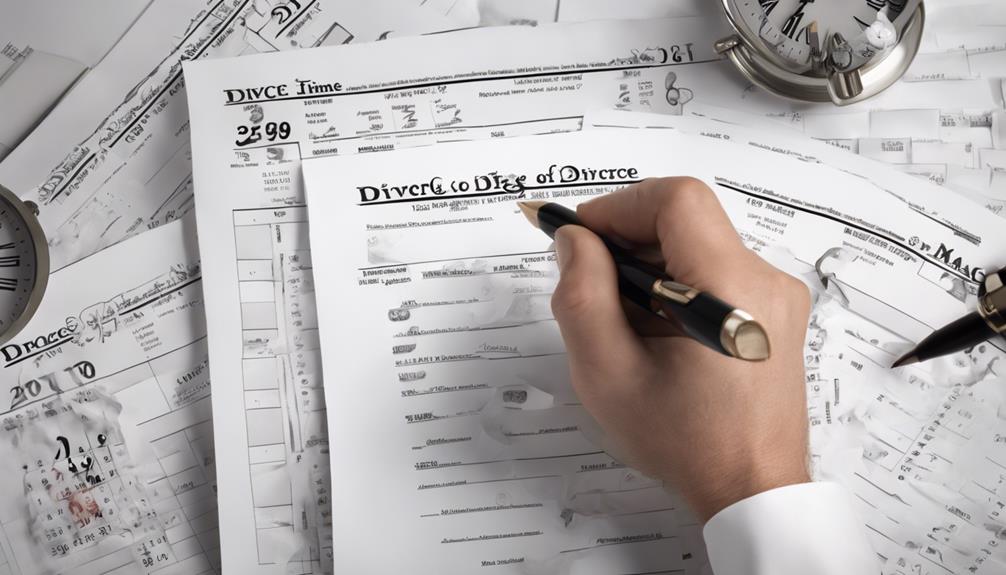Before starting the divorce process in Georgia, individuals may not be aware of the complexities involved in establishing the timeline for this important life event. Knowing the detailed steps and possible obstacles can answer the common question many people have: How long does it typically take to finalize a divorce in Georgia?
From filing initial paperwork to finalizing the divorce, each stage presents its own challenges and considerations that can affect the overall duration of the process. Stay tuned to uncover the key factors that impact the timeline of a divorce in Georgia.
Key Takeaways
- Understanding the minimum 31-day waiting period after filing is crucial for managing expectations.
- The finalization duration varies, ranging from months to over a year based on case complexity.
- Responding to the divorce complaint within 30 days is essential to protect rights and interests.
- Potential delays in divorce proceedings can arise from various factors, emphasizing the importance of transparency and cooperation.
Overview of Divorce Process in GA
When we begin looking at the divorce process in Georgia, it becomes apparent that there are specific steps and timelines that must be followed. In Georgia, once the divorce complaint is filed, a minimum of 31 days is required before the divorce can be finalized. This waiting period is mandated by Georgia law to give both parties time to consider their decision.
The finalization of a divorce in Georgia can vary depending on factors such as court schedules, the complexity of the case, and any agreements made between the parties.
Uncontested divorces, where both parties agree on all terms, tend to be finalized more swiftly compared to contested divorces, which may involve lengthy court proceedings. The timeline for a divorce in Georgia, from filing to finalization, can range from a few months to over a year, depending on the specific circumstances of the case.
It's essential for parties going through a divorce in Georgia to understand these timelines and processes to navigate the legal system effectively.
Filing Initial Divorce Paperwork

As we move forward from understanding the overview of the divorce process in Georgia, the initial step involves filing the necessary paperwork to initiate the divorce proceedings.
When filing the initial divorce paperwork, there are several key aspects to consider:
- Complaint for Divorce: The Complaint for Divorce is a crucial document that outlines the grounds for divorce, which can include reasons like irretrievable breakdown of the marriage or fault-based causes.
- Marriage Information: Specific details about the marriage, children, assets, and desired outcomes must be accurately provided in the initial paperwork.
- Filing Fees and Court Requirements: Understanding the filing fees and court requirements for serving the Complaint on the other party is essential to ensure the process moves forward smoothly.
Responding to Divorce Complaint
In responding to a divorce complaint in Georgia, filing an answer within 30 days of being served is a crucial step to protect your rights and interests in the proceedings. It is essential to address each allegation and request for relief made in the complaint in your response. You also have the option to include counterclaims or defenses to support your position. Failing to respond to the divorce complaint can lead to the court making decisions without considering your perspective. By responding promptly and accurately, you ensure that your voice is heard and your rights are safeguarded throughout the divorce process. Take the time to carefully craft your response to the divorce complaint to present your side effectively.
| Response Actions | Importance |
|---|---|
| File an answer within 30 days | Protects rights |
| Address allegations and relief requests | Ensures clarity |
| Consider counterclaims or defenses | Strengthens position |
Divorce Trial and Finalization

During a divorce trial in Georgia, presenting evidence, witness testimonies, and closing statements play crucial roles in reaching a final resolution. The final trial is a significant step when parties can't agree on key issues such as child custody, alimony, or division of assets. Here are some key points to keep in mind during the divorce trial process:
- Proper courtroom etiquette, punctuality, and respectful address towards the judge are essential for a smooth trial experience.
- The trial is overseen by either a judge or a jury, depending on the specifics of the case, and their decision will impact the final outcome.
- The judge issues a verdict based on the evidence presented and then issues the final decree of divorce, outlining the terms of the divorce agreement according to Georgia law.
Understanding the importance of witness testimonies, closing statements, and the role of the judge or jury can help navigate the divorce trial process more effectively.
Potential Delays in Divorce Proceedings
Spouses' conduct and willingness to collaborate can significantly influence the pace of divorce proceedings. Issues arise when one party conceals information crucial to the case, leading to potential delays.
Moreover, court schedule delays and backlogs can further prolong the process, even if both spouses are cooperative. Disputes over key issues such as alimony or asset division can stall the proceedings, necessitating additional court sessions.
These unresolved matters may require post-finalization court proceedings, causing further delays in the overall divorce timeline. It's essential for both parties to approach the divorce process with transparency and a cooperative mindset to minimize these potential delays.
Frequently Asked Questions
How Do I File for Separation in Ga?
We file for separation in Georgia by taking steps to live apart with the intent to end the marriage. It's crucial to consider the legal implications, especially on matters like child custody and financial support, while seeking guidance from a family law attorney.
Is the Divorce Process Similar in Georgia and Mississippi?
In Georgia and Mississippi, the steps to divorce are similar. Both states require filing a complaint, serving the spouse, and attending court hearings. However, Mississippi has a longer waiting period of 60 days before the divorce can be finalized, while Georgia only requires 30 days.
Conclusion
As we journey through the winding paths of divorce in Georgia, we may encounter obstacles that slow our progress. Yet, like a resilient oak tree weathering the storms, we can persevere and emerge stronger on the other side.
By navigating the process with patience and determination, we can pave the way for a new chapter filled with hope and growth. Trust in the process, and let the seeds of change blossom into a brighter future.











